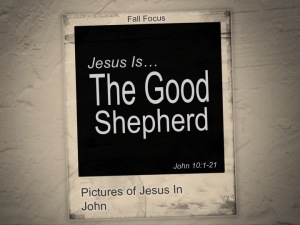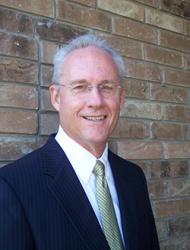by Berry Kercheville
Chapters nine and ten of John are closely related with the chapter division being unfortunate. When Jesus began his shepherd analogy he was in the midst of a discussion with the Pharisees who had cast the healed blind man out of the synagogue. After being cast out, Jesus, as a good shepherd, sought and found the man and called on him to accept that he was the Messiah. The blind man believed and worshiped him. Speaking to the Pharisees, Jesus introduced his shepherd speech by saying, “For  judgment I came into this world, that those who do not see may see, and those who see may become blind.” The “judgment” to which Jesus referred is the fact that his presence and his words would divide between those who were truly his and those who were following their own will. The sheepfold speech expounds on this in which Jesus gave two pictures of himself. The picture that flows through the text is, “I am the good shepherd.” Jesus also inserts a short parable when he says, “I am the door of the sheepfold.”
judgment I came into this world, that those who do not see may see, and those who see may become blind.” The “judgment” to which Jesus referred is the fact that his presence and his words would divide between those who were truly his and those who were following their own will. The sheepfold speech expounds on this in which Jesus gave two pictures of himself. The picture that flows through the text is, “I am the good shepherd.” Jesus also inserts a short parable when he says, “I am the door of the sheepfold.”
The Door of the Sheepfold
Jesus may be referring to a temporary sheepfold set up in the open field. This sheepfold consisted of four walls but no door. Once the sheep were inside the enclosure and night had fallen, the shepherd would lay down at the entrance of the enclosure. He literally became the door of the sheepfold. No sheep could enter or leave except through him. Therefore, Jesus indicted the Pharisees as “thieves and robbers” who tried to enter the sheepfold another way. The true sheep did not listen to them because they were not the true shepherd. This is reason the blind man did not listen to the Pharisees. It is also the reason the blind man’s parents submitted to the threats of the Pharisees; they were not Jesus’ sheep. The Pharisees, and the leaders of Israel who came before them, enriched themselves and were enamored with power at the expense of the sheep. Jeremiah condemned the leaders of his day with similar words:
“Woe to the shepherds who destroy and scatter the sheep of my pasture!” declares the LORD. Therefore thus says the LORD, the God of Israel, concerning the shepherds who care for my people: ‘You have scattered my flock and have driven them away, and you have not attended to them. Behold, I will attend to you for your evil deeds, declares the LORD. Then I will gather the remnant of my flock out of all the countries where I have driven them, and I will bring them back to their fold, and they shall be fruitful and multiply. I will set shepherds over them who will care for them, and they shall fear no more, nor be dismayed, neither shall any be missing, declares the LORD’” (Jer. 23:1-4).
The Good Shepherd
The prophets commonly used shepherd/sheep analogies. David was the most well-known shepherd who himself referred to God as his shepherd (Psalm 23). After exposing the leaders of Israel as failing as shepherds, Ezekiel revealed that God himself would shepherd his flock (34:15) and would “judge between sheep and sheep, between rams and male goats…between fat sheep and lean sheep” (34:17, 20). God would “rescue his flock” and “set up over them one shepherd, my servant David” (34:22-23). Once God placed “David” as their shepherd, “they would no more be a prey to the nations” and they would “dwell securely, and none shall make them afraid” (34:28). Therefore, when Jesus claimed to be the good shepherd, there is no question of his claim to be both God and the Messiah. The Pharisees ruled by fear; they drove the flock with intimidation. But Jesus calls his sheep one by one and his sheep hear his voice and follow because they recognize the voice of God. As the good shepherd, Jesus protects his sheep “and they will never perish, and no one will snatch them out of my hand” (John 10:28). The reason they will never perish is because of what makes Jesus a good shepherd. The good shepherd “lays down his life for the sheep.”
Lessons for Today
How beautiful the picture Jesus has given us. God is our shepherd. When I think about it, I breathe a sigh of relief. He alone is the good shepherd. He alone can give me peace and “make me lie down in green pastures.” He alone “restores my soul” and “guides me in the paths of righteousness.” He alone can bring me through “the valley of the shadow of death…comfort me…and prepare a table before me in the presence of my enemies.” We live in a world where men and women love power and love to rule over others. In political kingdoms we often live in fear; we cannot lie down in peace. No wonder Jesus said that lords were not allowed in his kingdom (Matt. 20:25-28) and that shepherds over his flock were not to “lord it over them” (1 Peter 5:4). How sad when shepherds create an authoritarian atmosphere causing fear and agitation. The chief Shepherd showed the way; he lays down his life for the sheep.
The sheep listen to the shepherd. That may sound simple, but these words have deep significance. I get discouraged when I see even so-called Christians refusing to obey certain commands of the Lord. But it doesn’t take long to discover the reason: they are not the Lord’s sheep; they do not hear the shepherd’s voice. But they are listening – to someone else; to some other philosophy, teaching, or common worldly viewpoint. Yes, they are listening, but not to the shepherd.
Jesus came to give us life in abundance (v. 10). In other words, the idea that as Christians we are missing out on something in this life is crazy. The only time we are missing out is when we do not have the good shepherd and do not have the life he came to give us.
There is security in Christ (v. 28). That certainly does not mean we can’t leave the Lord and be lost; after all, the true sheep hear His voice. But Jesus is saying, if you are His sheep and thus hear His voice, you won’t be lost, no way, ever. Paul said, “Now may the God of peace himself sanctify you completely, and may your whole spirit and soul and body be kept blameless at the coming of our Lord Jesus Christ. He who calls you is faithful; he will surely do it” (1 Thes. 5:23–24). Amen.
berrykerch@gmail.com

